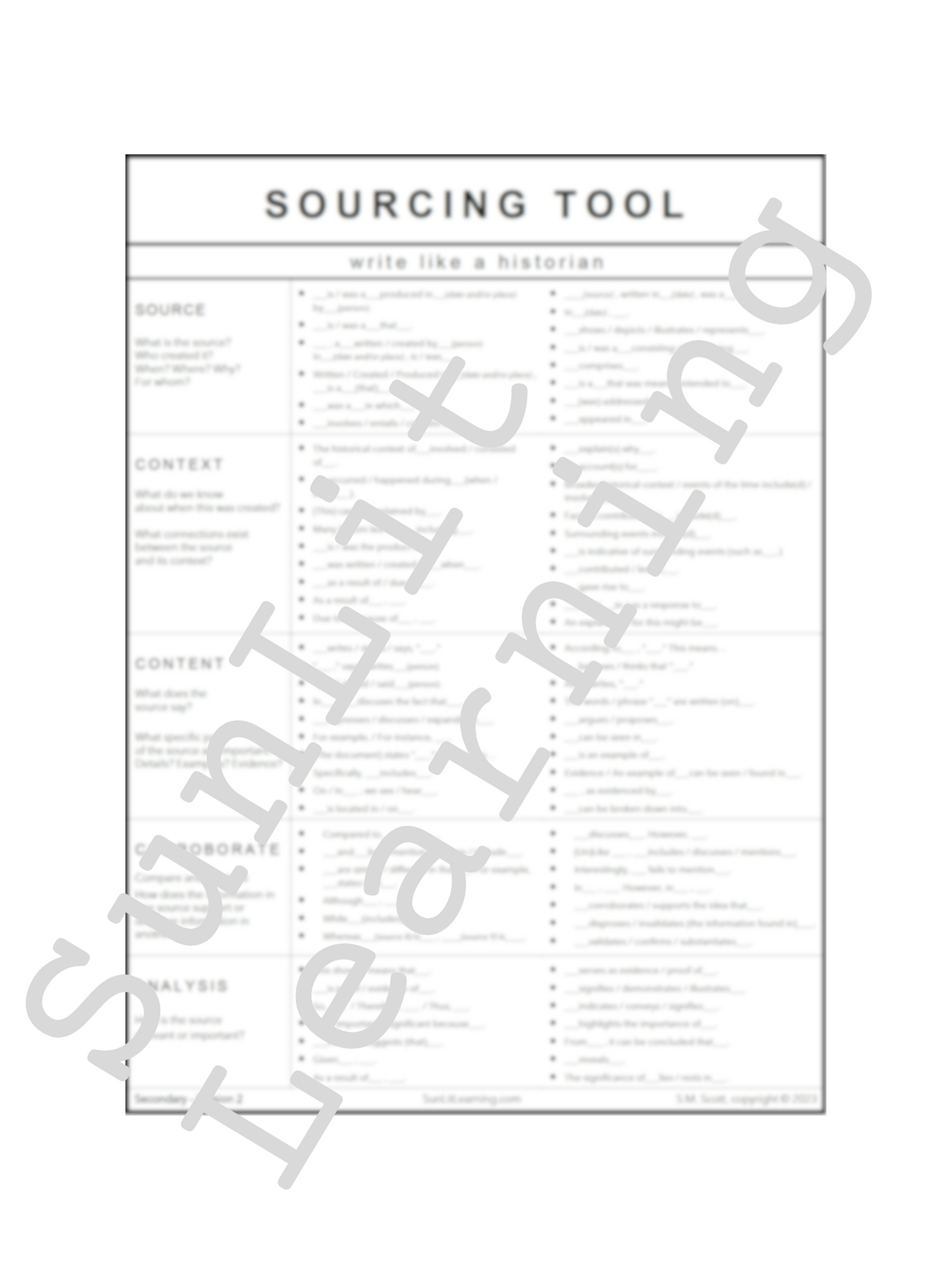SunLit Learning
Sourcing Tool - Secondary V2
Sourcing Tool - Secondary V2
Couldn't load pickup availability
Product
Write like a historian!
Reference tool for written analysis of primary and secondary sources. Perfect for writing assignments of any length in history / social science classes!
- Secondary - Ideal for writers in grades 6 and above.
- Includes sentence frame banks for source identification, content explanation, analysis, corroboration, and context.
SOURCING
Being able to source historical information is of utmost importance for several reasons:
-
Accuracy and credibility: Sourcing historical information allows for accuracy and credibility in historical research and analysis. By identifying and citing reliable sources, you ensure that the information you present is based on solid evidence and trustworthy accounts. Sourcing helps to distinguish between fact and fiction, minimizing the risk of inaccuracies or distortions in historical narratives.
-
Scholarly integrity: Properly sourcing historical information is essential for maintaining scholarly integrity. By acknowledging and attributing the sources of information, you demonstrate respect for the work of other scholars and researchers. It helps to uphold academic standards and ethical practices by giving credit where it is due and avoiding plagiarism.
-
Evaluation of evidence: Sourcing historical information facilitates the evaluation and critical analysis of evidence. By identifying the sources, you can assess the credibility, reliability, and bias of the information. Different sources may offer varying perspectives, and evaluating them allows for a more comprehensive understanding of historical events.
-
Building on existing knowledge: Historical research is built upon the foundation of previous studies and findings. Sourcing information enables you to trace the lineage of ideas, theories, and interpretations. By engaging with existing scholarship, you can contribute to the ongoing discourse and expand upon the collective knowledge in the field.
-
Engaging in dialogue and debate: Sourcing historical information allows for informed dialogue and debate among historians and researchers. By referencing specific sources, you provide a basis for discussion and analysis. Sourcing encourages the exchange of ideas, interpretations, and perspectives, fostering a deeper understanding of historical events and their significance.
-
Preservation and documentation: Sourcing historical information contributes to the preservation and documentation of historical sources. By citing and referencing primary and secondary sources, you help ensure that the original works and documents are acknowledged and preserved for future generations. This practice promotes the longevity and accessibility of historical information.
-
Establishing historical context: Sourcing information helps to establish the historical context of events, actions, and ideas. By referring to contemporary sources from the time period under study, you gain insights into the prevailing attitudes, beliefs, and circumstances that shaped historical events. This context enhances the depth and richness of historical analysis.
In summary, being able to source historical information is crucial for accuracy, credibility, scholarly integrity, critical analysis, building on existing knowledge, engaging in dialogue, preservation, documentation, and establishing historical context. By properly sourcing information, historians and researchers contribute to a rigorous and reliable understanding of the past, fostering an informed and comprehensive understanding of historical events and their significance.

Introduce your content
Answer your customers' common questions
List a frequently asked question
Then provide an answer that will help your customer make an informed purchase.

